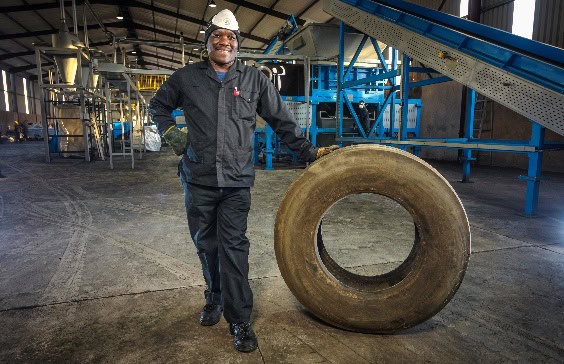THE use of large amounts of recycled rubber crumb for the manufacture of road surfaces and related products is propelling South Africa towards a circular economy where waste products are usefully used to address key infrastructure needs, says Dr Mehran Zarrebini, CEO of Hammarsdale-based radial truck tyre recycler, Mathe Group.
Much of the production from Mathe Group factory, which recycles approximately 1 000 radial truck tyres per day to produce 45 tons of rubber crumb, goes to bitumen product manufacturer, Tosas, for the manufacture of rubber modified bitumen, a product that is being used by the South Africa National Road Agency (SANRAL) for massive upgrades to the N1 in Gauteng and the N2 / N3 leading from the port of Durban.
Deon Pagel, MD of Tosas, explains that the company has been operating for more than five decades and was originally jointly owned by Total and Sasol. Tosas became part of the JSE-listed Raubex Group and operates from seven locations – Wadeville, Bloemfontein, Worcester, East London, Durban, Gaborone and Tsumeb in Namibia. The company has one of the best bitumen testing laboratories in southern Africa and is a world leader in the development of new bitumen products.
According to Pagel, although people still refer to so-called black top roads as “tarred” roads, the use of tar which is extracted from coal and is carcinogenic has been discontinued and replaced with bitumen, which is extracted from crude oil.
Bitumen, which, for chipseal applications is sprayed onto the road surface at up to double the temperature of boiling water, seals the top road layerworks, protecting the foundation layers beneath, acting as a waterproofing layer. Alternatively, it can be mixed in with the asphalt and acts as a glue, strengthening the road itself.
This bitumen that exits a refinery is modified. Rubber modified bitumen is created by mixing 20% rubber crumb with 80% bitumen and extender oils. “This is one of the most superior road bitumen products in the world and you have the benefit of recycling. You take old tyres and convert them into a usable product. It’s a win-win,” Pagel notes.
Bitumen rubber has now been generically specified by government and other road authorities for use in road construction throughout the country. Mathe Group’s role goes beyond producing rubber crumb through ambient grinding of radial truck tyres for Tosas. Together with Tosas, it designed and developed a second plant to produce New Crumb Rubber Technology (NCRT). This involves coating the rubber crumb with aromatic oil and specialised waxes to produce a pre-swollen rubber crumb that is bitumen rubber for asphalt mixes and spray seal applications that have greater longevity and much lower mixing temperatures.















